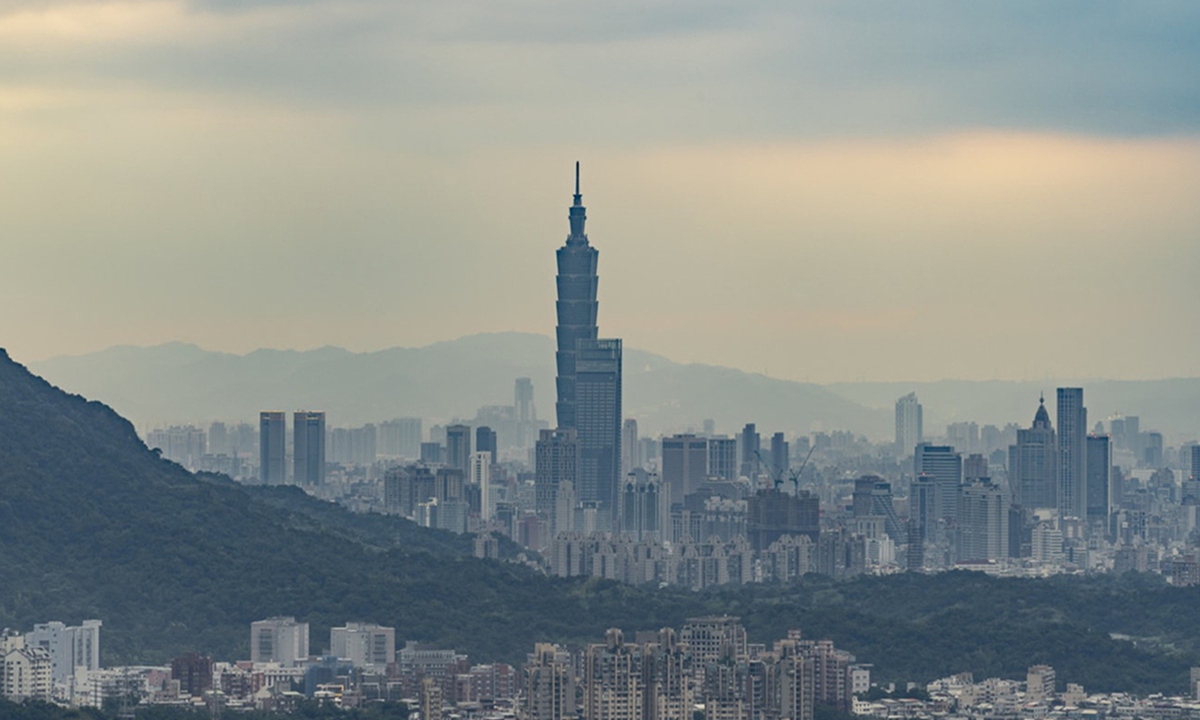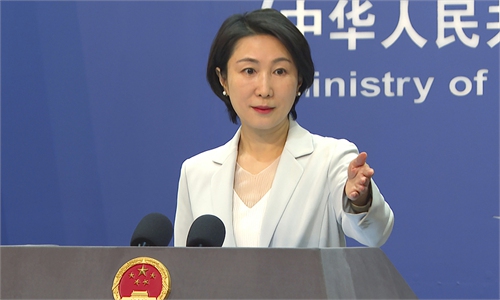Xi calls for strengthening patriotic united forces as security authority warns secessionists

A view of the Taipei city, Taiwan island Photo: Unsplash
The united front work should strengthen the patriotic united forces in Taiwan, and oppose the separatist acts of "Taiwan independence" forces, Xi Jinping, general secretary of the Communist Party of China (CPC) Central Committee, said in an article published in the flagship magazine of the CPC Central Committee on Tuesday.
Also on Tuesday, the Ministry of State Security (MSS) warned in a WeChat article that the Anti-Secession Law is "a sharp sword hanging over the heads of Taiwan secessionists," stating that the sword is only targeting secessionists instead of Taiwan compatriots, in order to safeguard China's sovereignty and territorial integrity.
Chinese mainland experts believe that the two articles highlighted the mainland's differentiated treatment of the Taiwan compatriots and the Taiwan secessionists: to encourage the patriotic united forces and to contain "Taiwan independence" forces. In the future, the mainland will be more precise and targeted in combating secessionists and will not give up any prospect of reunification in a peaceful way.
The article by Xi, also Chinese president and chairman of the Central Military Commission, was published in this year's second issue of the Qiushi Journal. The article stressed the importance of improving the Party's united front work in the new era, and provided a set of new concepts, ideas and strategies to enhance and improve the united front work from 12 aspects.
United front work in Hong Kong, Macao, and Taiwan region and among overseas Chinese should be improved to rally support, Xi said in the article.
United front work should implement the Party's overall strategy for resolving the Taiwan question in the new era, develop and strengthen the patriotic united forces in Taiwan, oppose the separatist acts of "Taiwan independence" forces, and promote the complete reunification of the motherland, Xi noted.
According to Zheng Jian, a professor of Taiwan Research Institute of Xiamen University, "consolidating and developing the broadest patriotic united front" was clearly put forward in the report of the 18th National Congress of the CPC in 2012, with multiple supporting policies and measures launched afterwards.
Rallying support from Taiwan people, which the mainland has been consistent on in its policies, will not be halted despite that the Democratic Progressive Party's (DPP) Lai Ching-te won the regional leadership election, Zheng said, noting that the mainland will still promote the construction of the demonstration zone for cross-Straits integration and development in Fujian Province.
Remarks from Xi show that the mainland seeks to differentiate DPP authorities and secessionist groups from Taiwan compatriots, Wang Yingjin, director of the Center for Cross-Straits Relations Studies at the Renmin University of China, told the Global Times on Tuesday.
The mainland will resolutely suppress and contain the "Taiwan independence" secessionist forces, but for the Taiwan people and groups from different sectors who support the 1992 Consensus, the mainland still welcomes cross-Straits interaction and integrated development, Wang said.
The mainland has not given up on continuing to push for peaceful reunification, Wang said, adding that the mainland will think more about how to strike at "Taiwan independence" secessionist forces in a targeted manner without hurting the Taiwan people and win over their hearts and minds.
Stern warning
On the other hand, the article released by MSS involves more warnings, as Lai, the diehard secessionist, did not show any kindness to the mainland even in his post-election speech.
The article introduced the Anti-Secession Law adopted in March 2005, after DPP's Chen Shui-bian was re-elected to a second term as Taiwan regional leader in 2004. The article compared the law to "a sword hanging over the heads of the Taiwan secessionists," to deter their acts of splitting the country, and to maintain peace and stability across the Taiwan Straits, rather than against the ordinary people in Taiwan.
The article stressed three circumstances stipulated in the law that allow the state to employ non-peaceful means and other necessary measures to protect China's sovereignty and territorial integrity, including the event that the "Taiwan independence" secessionist forces should act under any name or by any means to cause the fact of Taiwan's secession from China, or that major incidents entailing Taiwan's secession from China should occur, or that possibilities for a peaceful reunification should be completely exhausted.
The article concludes by saying that the DPP has only the self-interest and completely disregards the interests and well-being of the people on both sides of the Taiwan Straits, and there is only one end, which is to be shattered to pieces and fall from grace.
By stressing the Anti-Secession Law at this moment, the MSS is warning Lai, who is regarded as a more stubborn and diehard secessionist than Tsai Ing-wen, that "do not think that you can do whatever you want after being elected," Zheng said.
Even if Lai pursues progressive secession, it will not go far as well, as when the mainland decides that the possibility of peaceful reunification is completely exhausted, then naturally it will hit the red line of Anti-Secession Law, Zheng noted.
According to Wang, after Lai takes office, the cross-Straits relations are expected to get worse, with increased uncertainties and risks.
"The Chinese mainland will definitely contain Taiwan secessionists from all aspects, including military, diplomatic, economic, political… And we're not going to be soft on this," Wang remarked.
The Chinese Foreign Ministry on Monday welcomed Nauru's decision of severing "diplomatic ties" with the Taiwan region, which was announced on Monday.
On Tuesday, the defense authority on the island of Taiwan said in a press release that it had detected 15 aircraft and three vessels of the Chinese People's Liberation Army (PLA) around the island over the past day.
Among the 15 PLA aircraft, a Y-8 anti-submarine aircraft and an unmanned aerial vehicle entered the island of Taiwan's self-proclaimed air defense identification zone, while the other 13, consisting of main combat and supportive aircraft including J-10C fighter jets, operated in the western side of the Taiwan Straits, according to a map attached to the press release.
The PLA holds patrols and exercises around the island of Taiwan on a regular basis, so the recent PLA activities are not related with the regional election on the island, but aim to enhance combat readiness and resolutely safeguard national sovereignty and territorial integrity from any "Taiwan independence" secessionist activities, a Chinese mainland military expert who requested anonymity told the Global Times on Tuesday.
Should Lai make further "Taiwan independence" moves after his election, it cannot be ruled out that the PLA will make further countermeasures that send warnings to secessionists and external interferences forces, enhance its capabilities in resolving the Taiwan question, and push forward the progress of national reunification, analysts said.
From PLA's military operation to the Ministry of National Security's law enforcement, the mainland is waving a dragnet of full coverage against secessionists, said Zheng. "Secessionists will have to pay a price, and patriotic promotion of reunification will be supported."



